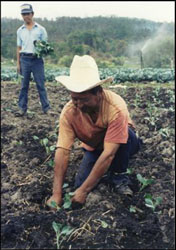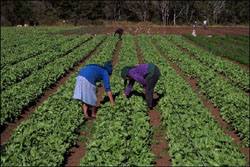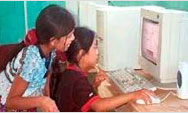You are here » Home » Telling Our Story
|
| Agricultural Diversification Increases Earnings
|
USAID helps farmer from Honduras raise his annual sales by 643% |
|
|
Luis Flores was a sales manager for a small produce distributor in La Esperanza, a rural town in the highlands of central Honduras. Through this experience, he became aware of the market demands and requirements in the major Honduran cities of San Pedro Sula and Tegucigalpa. He observed that the main problem was not the lack of demand, but the lack of supply of locally produced cold climate vegetables.
Luis started with 0.7 hectares of land and two crops (cauliflower and squash). Six months later, he received assistance from USAID to implement good agricultural practices and improved production technologies. As a result, his yields and monthly sales gradually started to rise. He now cultivates carrots, lettuce, squash, cauliflower, beets, green beans, cilantro and oriental cabbage on 3.5 hectares.
|

|
Before
Luis was producing only two crops with basic technology. His annual sales were $350 per month. Luis had problems meeting market requirements such as quality and supply consistency.
|
| Photo: USAID/Honduras |
|
|
After
With USAID assistance, Luis diversified his production from two crops to eight cold climate vegetables, with year round production. This year-round production was possible due to improved agricultural practices and calendarized production. Luis is now able to meet quality standards and supply his buyers year-round. His annual sales reached $65,455 in 2002 and have stabilized at an average of $5,400 per month in 2003.
|
 |
Photo: Agribusiness Development Center
|
|
|
Print-friendly version of this page (250kb - PDF)
Back to Top ^
|


